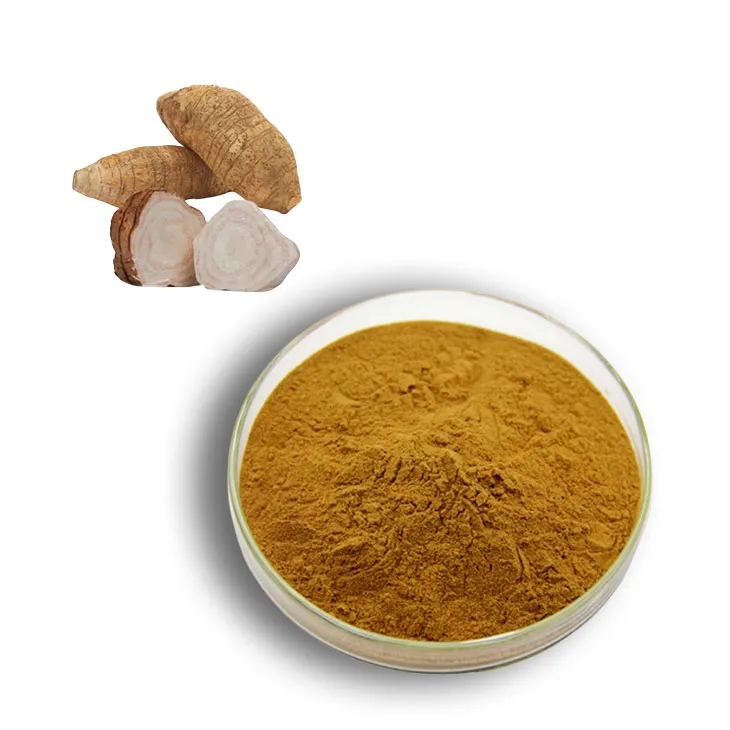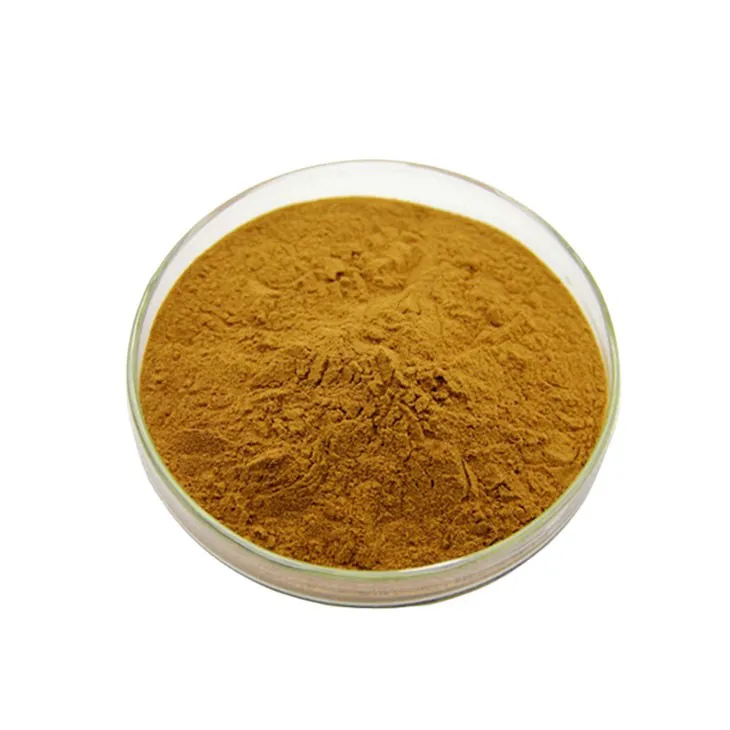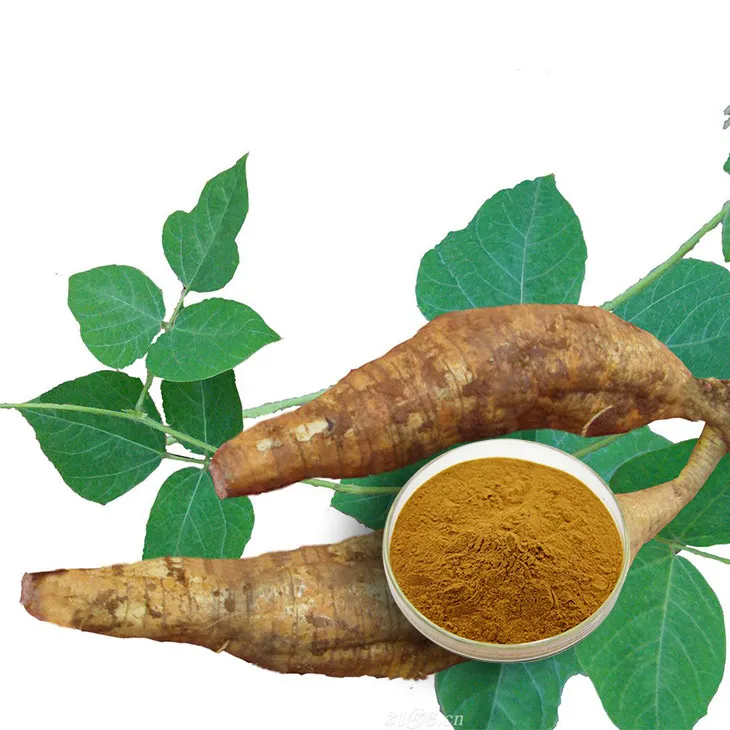- 0086-571-85302990
- sales@greenskybio.com
Organic Pueraria lobata Extract Powder Suppliers.
2024-11-28

1. Introduction
In the ever - expanding market of natural health products, organic Pueraria Lobata Extract powder has gained significant popularity. This powder, derived from the Pueraria lobata plant, is known for its numerous potential health benefits. As a result, suppliers of this product play a crucial role in determining its quality and availability in the market.

2. Importance of Raw Material Selection
2.1 Soil Quality
The quality of the soil where Pueraria lobata is grown has a direct impact on the plant's growth and the subsequent quality of the extract powder. Soil rich in nutrients such as nitrogen, phosphorus, and potassium can support healthy plant growth. For example, nitrogen is essential for the production of proteins in the plant, which are precursors to many of the active compounds in the extract. If the soil is deficient in these nutrients, the plant may not produce the optimal amount of beneficial compounds.
2.2 Climate Conditions
Climate also plays a vital role. Pueraria lobata thrives in certain temperature and humidity ranges. Extreme temperatures, either too hot or too cold, can stress the plant and affect its metabolic processes. Adequate sunlight is necessary for photosynthesis, which is crucial for the production of secondary metabolites. For instance, in areas with inconsistent sunlight, the plant may not synthesize isoflavones as effectively as in regions with more stable sunlight conditions.
2.3 Farming Methods
Organic farming methods are preferred when it comes to producing high - quality Pueraria lobata for extract powder. Organic farming avoids the use of synthetic pesticides and fertilizers, which can leave residues in the plant. Instead, natural fertilizers such as compost and manure are used. These not only provide nutrients but also improve the soil structure. Additionally, sustainable farming practices like crop rotation can help prevent the build - up of pests and diseases, ensuring a healthy crop of Pueraria lobata.

3. The Complexity of the Extraction Process
3.1 Need for Professional Expertise
The extraction of Pueraria Lobata Extract powder is a complex procedure that requires a high level of expertise. Suppliers need to have a team of professionals who are well - versed in the latest extraction technologies. These professionals understand the chemical composition of Pueraria lobata and can select the most appropriate extraction method based on the desired end - product.
3.2 Modern Extraction Technologies
There are several modern extraction technologies available for Pueraria lobata. For example, supercritical fluid extraction (SFE) is a popular method. It uses a supercritical fluid, such as carbon dioxide, as the solvent. This method has several advantages. It can operate at relatively low temperatures, which helps to preserve the heat - sensitive compounds in Pueraria lobata, such as isoflavones. Another method is ultrasonic - assisted extraction (UAE), which uses ultrasonic waves to enhance the extraction efficiency. UAE can break down the cell walls of the plant material more effectively, allowing for better release of the active compounds.
3.3 Impact on Purity and Concentration
The choice of extraction technology has a significant impact on the purity and concentration of the extract. A well - executed extraction process can result in a high - purity product with a high concentration of active compounds. For example, if the extraction method is not optimized, there may be impurities from the plant matrix or the solvent used. On the other hand, an efficient extraction can ensure that the isoflavones, which are among the key active compounds in Pueraria lobata, are present in a concentrated form, maximizing their potential health benefits.

4. Quality Assurance Systems
4.1 Testing for Contaminants
Contaminants can pose a serious threat to the safety and quality of the organic Pueraria Lobata Extract powder. Suppliers should regularly test for contaminants such as pesticides (even in organic farming, there is a risk of cross - contamination), herbicides, and other environmental pollutants. Advanced analytical techniques like gas chromatography - mass spectrometry (GC - MS) can be used to detect and quantify these contaminants at very low levels.
4.2 Heavy Metal Testing
Heavy metals such as lead, mercury, and cadmium can accumulate in plants, especially if they are grown in polluted soil or water sources. High levels of heavy metals in the extract powder can be harmful to human health. Therefore, suppliers must conduct regular heavy metal testing using techniques like atomic absorption spectrometry (AAS) or inductively coupled plasma - mass spectrometry (ICP - MS). If heavy metal levels are detected above the acceptable limits, appropriate measures should be taken to address the issue, such as rejecting the raw materials or improving the purification process.
4.3 Microbial Testing
Microbial contamination is another concern. Bacteria, fungi, and yeasts can grow on the plant material during cultivation, harvesting, or processing. Suppliers need to test for microbial levels using methods such as plate count assays and polymerase chain reaction (PCR) - based techniques. If high microbial counts are found, steps such as sterilization or improved storage conditions should be implemented to ensure the safety of the product.
5. Meeting Customer Requirements
5.1 Product Specifications
Customers often have specific requirements for the organic Pueraria lobata extract powder. These may include the concentration of isoflavones, the particle size of the powder, and the overall purity of the product. Suppliers need to be able to meet these specifications consistently. For example, if a customer requires a powder with a high concentration of a particular isoflavone for use in a dietary supplement, the supplier must have the ability to produce and deliver such a product.
5.2 Packaging and Labeling
Proper packaging is essential to protect the quality of the extract powder. Packaging materials should be chosen based on their ability to prevent moisture absorption, oxidation, and contamination. Additionally, accurate labeling is required by law and is also important for customer satisfaction. The label should include information such as the product name, the source of the Pueraria lobata, the extraction method used, and any relevant warnings or instructions for use.
5.3 Customer Service
Good customer service is another aspect that suppliers should focus on. This includes promptly answering customer inquiries, providing technical support if needed, and handling any complaints or issues in a timely and satisfactory manner. For example, if a customer has a question about the stability of the product or its compatibility with other ingredients, the supplier should be able to provide accurate and useful information.
6. Sustainability Considerations
6.1 Environmental Impact
Suppliers of organic Pueraria lobata extract powder should also consider the environmental impact of their operations. This includes reducing waste during the extraction process, conserving water, and using renewable energy sources if possible. For example, some extraction facilities may be able to recycle the solvents used, reducing the amount of waste generated. Additionally, using energy - efficient equipment can help reduce the carbon footprint of the production process.
6.2 Social Responsibility
There is also a social responsibility aspect to consider. Suppliers may work with local farmers to ensure fair prices for the Pueraria lobata raw materials. This can help support the local economy and improve the livelihoods of farmers. Moreover, ensuring safe working conditions for employees in the extraction and processing facilities is also an important part of social responsibility.
7. Conclusion
In conclusion, suppliers of organic Pueraria lobata extract powder have a multi - faceted role to play. From carefully selecting the raw materials based on soil quality, climate conditions, and farming methods, to mastering the complex extraction process, implementing a sound quality assurance system, meeting customer requirements, and considering sustainability, each aspect is crucial. By doing so, suppliers can not only ensure the production of a high - quality product but also contribute to the growth and development of the natural health products market.
FAQ:
Q1: What should be considered when selecting raw materials for organic Pueraria lobata extract powder?
When selecting raw materials for organic Pueraria lobata extract powder, factors such as soil quality, climate conditions of the growing area, and farming methods should be considered. These factors can all impact the final quality of the extract powder.
Q2: Why is the extraction process important for suppliers of organic Pueraria lobata extract powder?
The extraction process is important because it is a complex procedure that demands expertise. A professional team well - versed in the latest extraction technologies is needed. These technologies determine the purity and the concentration of active compounds in the extract. For example, they can better preserve the isoflavones which have antioxidant and estrogen - like effects.
Q3: What does a sound quality assurance system for organic Pueraria lobata extract powder suppliers include?
A sound quality assurance system for these suppliers includes regular testing of the product for contaminants, heavy metals, and microbial levels. This helps to provide customers with a safe and high - quality organic Pueraria lobata extract powder.
Q4: How can suppliers ensure the quality of organic Pueraria lobata extract powder?
Suppliers can ensure the quality by starting with strict raw material selection considering factors like soil and climate. They also need to have a professional team for the extraction process to ensure the purity and concentration of active compounds. Moreover, a sound quality assurance system with regular testing for contaminants, heavy metals, and microbial levels is essential.
Q5: What are the benefits of modern extraction methods for organic Pueraria lobata extract powder?
Modern extraction methods for organic Pueraria lobata extract powder can better preserve the isoflavones. These isoflavones are known for their antioxidant and estrogen - like effects, thus enhancing the value of the extract powder.
Related literature
- The Chemical Constituents and Pharmacological Effects of Pueraria lobata"
- "Organic Extraction of Medicinal Plants: A Review with Focus on Pueraria lobata"
- "Quality Control in the Production of Pueraria lobata Extract Powder"
- ▶ Hesperidin
- ▶ citrus bioflavonoids
- ▶ plant extract
- ▶ lycopene
- ▶ Diosmin
- ▶ Grape seed extract
- ▶ Sea buckthorn Juice Powder
- ▶ Beetroot powder
- ▶ Hops Extract
- ▶ Artichoke Extract
- ▶ Reishi mushroom extract
- ▶ Astaxanthin
- ▶ Green Tea Extract
- ▶ Curcumin Extract
- ▶ Horse Chestnut Extract
- ▶ Other Problems
- ▶ Boswellia Serrata Extract
- ▶ Resveratrol Extract
- ▶ Marigold Extract
- ▶ Grape Leaf Extract
- ▶ blog3
- ▶ blog4
-
Cactus Extract Supplier
2024-11-28
-
Optimal Bioavailability of Vitamin C.
2024-11-28
-
Extraction process of wheat germ extract.
2024-11-28
-
100% Pure Natural L - Theanine Powder.
2024-11-28
-
The best nutmeg extract in nature.
2024-11-28
-
Chia Seed Powder
2024-11-28
-
Alisma Extract
2024-11-28
-
Shikone Extract
2024-11-28
-
Almond Extract Powder
2024-11-28
-
Nettle leaf extract
2024-11-28
-
Stevia Extract
2024-11-28
-
Cactus Extract
2024-11-28
-
Alfalfa Meal
2024-11-28
-
Motherwort Extract
2024-11-28
-
Medicinal Marshmallow Extract
2024-11-28





















